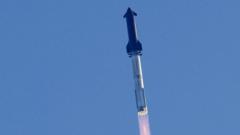Investigators will assess the causes behind the incident before deciding the future of the groundbreaking rocket.
**SpaceX's Starship Grounded Following Catastrophic Test Flight Failure**

**SpaceX's Starship Grounded Following Catastrophic Test Flight Failure**
The FAA pauses Starship operations after an explosion during its latest test over the Caribbean.
The United States has temporarily grounded SpaceX's Starship rocket following a catastrophic incident during its most recent test flight, which resulted in an explosion. The rocket, which represents a key component in Elon Musk's plans for space exploration, particularly the colonization of Mars, broke apart and disintegrated over the Caribbean after lifting off from Texas this Thursday. As a consequence, commercial airline flights were redirected to avoid any falling debris from the disintegration.
The Federal Aviation Administration (FAA) is collaborating closely with SpaceX and other agencies to verify claims of damage to property on the Turks and Caicos Islands due to falling debris. Fortunately, there have been no injuries reported from the incident. The FAA has mandated a "mishap" investigation to ascertain the root cause of the explosion, and it will evaluate the results before allowing the Starship rocket to resume flights. A "debris response area" was implemented to manage air traffic, leading to some flights being diverted due to low fuel levels while awaiting clearance.
During the test flight, which was the seventh for Starship and the first involving a new, taller version of the rocket, the vehicle lifted off as planned at 17:38 EST (22:38 GMT). Approximately four minutes into the flight, the upper stage was supposed to separate from its Super Heavy booster, but communications were abruptly lost. Despite this setback, the Super Heavy booster managed to return to the launchpad, leading to a round of applause from mission control.
SpaceX later reported that the upper stage experienced what was described as a "rapid unscheduled disassembly." Musk indicated that initial analyses suggest a potential issue stemming from an "oxygen/fuel leak in the cavity above the ship's engine firewall." He optimistically stated that, as of now, "nothing suggests postponing the next launch beyond next month."
At a towering height of 123 meters (403 feet), the Starship rocket system is engineered to be fully reusable, positioning itself as a significant player in future space travel. NASA plans to employ a modified version of Starship as a lunar lander for its Artemis missions aimed at returning astronauts to the Moon. Looking ahead, Musk envisions Starship facilitating long-distance travel to Mars, which would take approximately nine months in each direction.
This test flight occurred shortly after news of Blue Origin's New Glenn rocket system making its inaugural orbit flight, marking a significant advancement for Jeff Bezos’ space initiatives. Both billionaires are in a competitive race to dominate the burgeoning space launch industry.




















